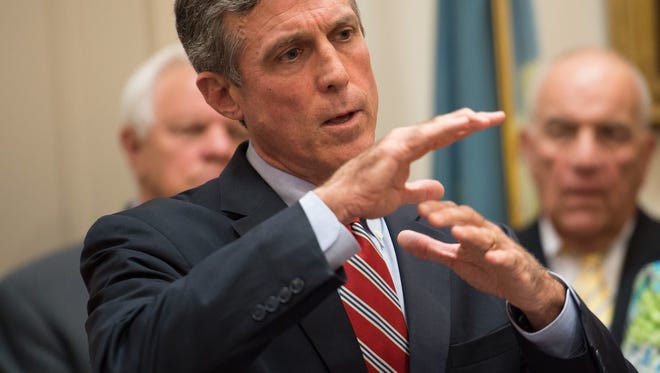Delaware leaders mount offensive to stop offshore drilling plan
 Maddy Lauria
Maddy Lauria![Delaware Attorney General Matthew Denn said in a letter to federal officials that “Delaware will need to consider taking legal steps to protect its residents if the Department [of Interior] declines to proceed in the manner required by law.”](/gcdn/-mm-/7a81bce59219e091336fdaea5f8ca089417f6a19/c=0-101-2000-1231/local/-/media/2017/11/21/Wilmington/Wilmington/636468796468974291-112117-WIL-Matt-Dean-JM02.jpg?width=660&height=373&fit=crop&format=pjpg&auto=webp)
Delaware leaders are ready to go to court to protect the First State’s coastline from offshore drilling.
“The health of Delaware’s economy and environment are directly tied to the health of the state’s coastal areas,” Gov. John Carney wrote in a Thursday letter to federal officials. “I cannot accept the tremendous risks associated with opening vast areas in the Atlantic to drilling.”
Earlier this month the Trump administration announced the largest ever leasing plan for offshore oil and gas activities, spanning 25 of 26 planning areas including the entire East Coast. Less than a week after that announcement, Interior Secretary Ryan Zinke said Florida’s coast would be excluded following a discussion with Gov. Rick Scott.
“I support the governor’s position that Florida is unique and its coasts are heavily reliant on tourism as an economic driver,” Zinke said on Twitter as he announced Florida’s coast would be removed from the plan.

Carney said he would like that same opportunity.
“We urge you to maintain the longstanding protections in place for Delaware and coastal areas throughout the Atlantic region, and reverse this decision,” he wrote.
Zinke answered Carney's request on Friday with a phone call, during which the governor invited the secretary to the First State to see the local beach communities, natural resources and economy threatened by the proposal. Zinke accepted the invitation, Carney said.
"Delaware simply cannot accept the risks associated with offshore drilling, and we will continue expressing our concerns to the Trump Administration," Carney said in a statement. "I was encouraged by my conversation with Secretary Zinke today and look forward to continued dialogue."
Delaware Attorney General Matt Denn said in a separate letter sent to Zinke on Jan. 11 that “Delaware will need to consider taking legal steps to protect its residents if the Department [of Interior] declines to proceed in the manner required by law.”
Denn said the way the recent rewrite of a five-year oil and gas leasing plan was handled – especially a lack of communication with governors before proposing the plan – suggests a possible violation of federal law and constitutional due process rights.
“The law does not permit the Department to formally promulgate a draft proposed program based on arbitrary, or worse, purely political considerations, and then adjust it on an ad-hoc and rolling basis as persons with personal access to its leadership raise objections,” Denn wrote.
RELATED:Trump administration opens Delaware coast to offshore drilling
U.S. Sens. Tom Carper and Chris Coons, both of Delaware – along with three dozen of their colleagues – also penned a letter to Zinke criticizing the plan.
“Offering 47 leases by expanding drilling into the Arctic, Pacific, Atlantic and Eastern Gulf of Mexico waters would lock us into decades of carbon pollution, and endanger future generations and livelihood simply for short-term gain of major oil companies,” the letter reads.
Zinke said in a Jan. 4 teleconference that the 47 leases proposed in the National Outer Continental Shelf Oil and Gas Leasing Program spanning 2019-2024 marks the largest number of lease sales ever proposed – far more than the 11 lease sales approved by the Obama administration.
“This is a clear difference between energy weakness and energy dominance,” Zinke said.
The recently proposed plan will replace the Obama administration’s leasing schedule for 2017-2022, as requested by President Donald Trump’s “Implementing an America-First Offshore Energy Strategy” executive order signed in April.
Carper, Coons and their colleagues said they “are deeply troubled” by the expansion of offshore drilling leases and called it “an ill-advised effort to circumvent public and scientific input.”
U.S. Rep. Lisa Blunt Rochester, D-Del., also said in a statement that opening the Atlantic to oil and gas activities will “jeopardize the economic, environmental and public health of Delaware’s communities and directly contribute to global climate change and rising sea levels.”

Carney said the new proposed plan could threaten the state’s $7 billion coastal economy, which supports more than 60,000 jobs in fishing, tourism and recreation and brings millions of visitors to the state each year.
“Opening areas on the Outer Continental Shelf off the Atlantic coast threatens the economic and environmental well-being of Delaware and states throughout the entire region,” Delaware’s governor wrote. “This extreme decision poses severe risks to vital environmental areas in our states, as well as the fishing, tourism and recreational industries that depend on them.”
The public will have the opportunity to learn more about the proposed plan during a Bureau of Ocean Energy Management meeting at the Holiday Inn at 561 N. Du Pont Highway in Dover from 3-7 p.m. on Thursday.
People can comment on the proposed plan through March 9 by searching “BOEM-2017-0074” at www.regulations.gov or by sending written comments to Kelly Hammerle, National OCS Oil and Gas Leasing Program Manager, Bureau of Ocean Energy Management (VAM-LD), 45600 Woodland Road, Sterling, VA 20166-9216.
Contact reporter Maddy Lauria at (302) 345-0608, mlauria@delawareonline.com or on Twitter @MaddyinMilford.